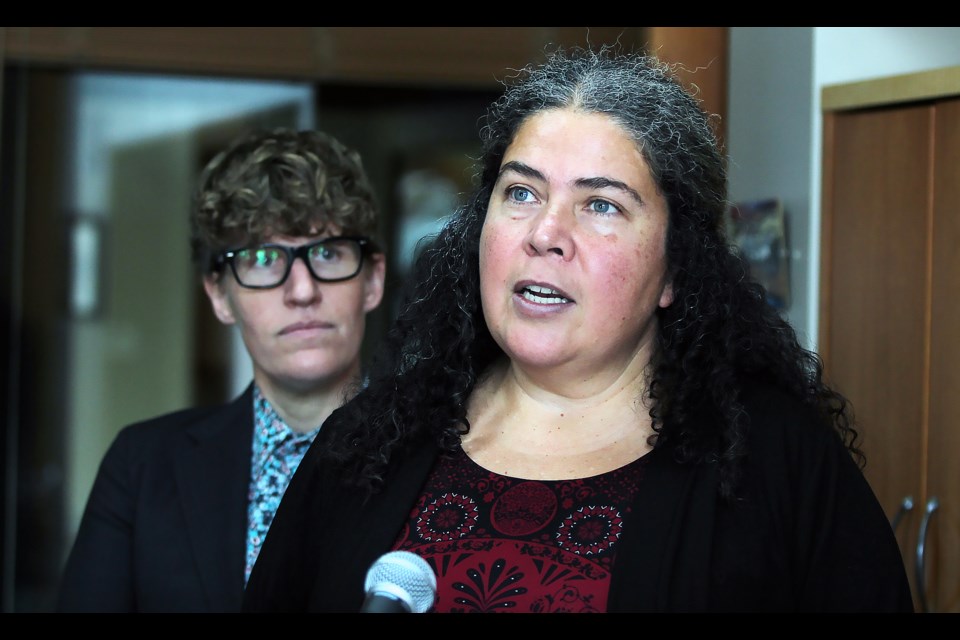BOW VALLEY – Banff-Kananaskis MLA Sarah Elmeligi and the NDP’s critic for housing remain hopeful a bill imposing limits on rent increases in the province will pass in the spring legislature to bring relief to Bow Valley area renters.
Elmeligi and NDP MLA for Edmonton-Highlands-Norwood Janis Irwin, who introduced Bill 205 in December, are challenging the UCP to support a two per cent temporary rental cap over two years, followed by a subsequent two-year rental cap indexed to inflation.
“One of the reasons why this was the focus of my bill was, first of all, we’re in an unprecedented housing crisis,” said Irwin. “We have rent rising faster in Edmonton and Calgary faster than any other city in Canada.”
According to a national rent report by Urbanation, annual rent inflation for purpose-built and condominium rentals in January 2024 was second highest in Alberta at 17.8 per cent. In first was Nova Scotia at 19.1 per cent and Saskatchewan was third at 17.5 per cent.
In Alberta, rent surged by over 15 per cent in 2023, surpassing increases in all other provinces. Calgary and Edmonton experienced the highest rent hikes among major Canadian cities.
The Job Resource Centre’s 2023 fall market review for Banff and Canmore reported the average rental rates for a one-bedroom unit in Canmore is $2,347 and $2,886 for a two-bedroom unit. In Banff, rental rates average $1,720 for a one-bedroom unit and $2,358 for a two-bedroom.
Compared to 2022, rental rates for a one-bedroom unit in Canmore rose 29 per cent from $1,824. Banff, however, experienced a marginal decrease in average rental rate for a one-bedroom from $1,757.
Elmeligi said the rising cost of living in the Bow Valley exacerbates rising rent, paired with a housing shortage.
“I’ve had a couple constituents email me and say that in the last three years their rent has gone up 30-40 per cent, but their wage has not increased at all, or maybe five per cent in that same period of time,” said Elmeligi of the Bow Valley area. “I think when you’re already looking at a community that struggles with affordability in general – everything is more expensive in the Bow Valley – and then you have rent increasing 30 per cent and wages are not … it basically means people are being faced with the decision to stay in town or go.
“The UCP doesn’t have a track record of thinking all our ideas are amazing, but what this bill does is it really enables us to start a conversation with Albertans about the housing crisis and diversity of solutions that need to be applied to truly address it.”
Alberta is the largest province in Canada with no limit on how much landlords can increase rents. Nova Scotia, Newfoundland and the territories also don’t have rent caps.
Irwin pointed out there are conservative provinces, like Saskatchewan, that have passed some form of a rent cap or rnt control policy, so she doesn't see it as an ideological issue.
In response to the bill, introduced by Irwin in the legislature in December, UCP Minister of Seniors, Community and Social Services Jason Nixon has already publicly stated he does not support rent control.
“Alberta’s government will not introduce rent control,” said Nixon in a statement to the Outlook, adding he believes “rent control does not work.”
He said the premier’s mandate letter instead tasked the ministry with crafting a strategy for affordable home ownership and rentals, which involves incentivizing new construction, offering financing options and eliminating barriers for buyers and renters.
Elmeligi is challenging the minister on this strategy.
“It’s so inequitable to suggest that you’re going to hold a municipality back from addressing housing when people are living in their vans or you have 15 young people living in one three-bedroom house in Banff – we know that kind of thing is happening (…),” she said.
Elmeligi suggested the bill would be a first step in tackling the larger issue of a lack of affordable housing in the Bow Valley.
“We recognize that rent caps and this bill is not the entirety of the solution to the housing crisis. What it does is it gives us something that we could implement today, that would help people today, while we focus on really addressing the cause which is that we need more affordable housing units available.”
“But those need to be built and designed and that takes time, so rent caps could help people in our communities right now.”
If passed in the spring sitting of the legislature, which began Wednesday (Feb. 28), the bill would also increase reporting requirements to ensure the government is meeting intended housing targets.
The UCP’s affordable housing strategy aims to support 25,000 more homes by 2031.
The Local Journalism Initiative is funded by the Government of Canada. The position covers Îyârhe (Stoney) Nakoda First Nation and Kananaskis Country.




